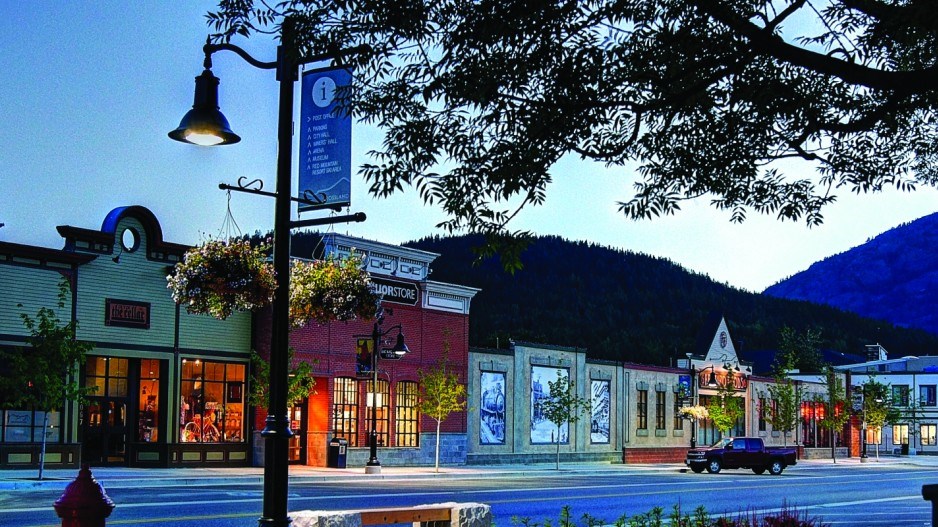Rossland is best known for its skiing. Over the years, it has produced a disproportionate number of Olympic skiers – Nancy Greene Raine among them – and has been voted one of the top 10 places in the world to visit by the New York Times and No. 1 ski town in North America by Powder Magazine.
But the tiny B.C. town of 3,600 – tucked away in the bottom southeast corner of the province – is reinventing and marketing itself as the next satellite of Silicon Valley North.
Thanks to low real estate prices, proximity to world-class skiing and mountain biking, low tax rates and subsidized fibre optic network, the town has begun to lure millennials and Gen X entrepreneurs desperate to escape Vancouver’s congestion and high housing costs.
“On an affordability standpoint, it’s extremely attractive for companies to come in because their young people can have amazing recreation and affordability,” said Howard Katkov, an American businessman who built a house in Rossland in 2004 just for the skiing at Red Mountain Resort, which he then ended up buying.
“You can buy a new home in Rossland for $400,000,” said Cezary Ksiazek, a building contractor and director for the Trail and District Chamber of Commerce.
One of the companies lured to Rossland recently is Thoughtexchange, a software company with a 70-person headcount.
Thoughtexchange CEO Dave MacLeod, who lived in North Vancouver for years, moved to Rossland three years ago largely for lifestyle reasons when he was co-founding the company. He liked the idea of raising his children in a small town with good skiing.
But there are also business advantages for a startup setting up in a small town, he said.
“Office space isn’t going to bankrupt you in your early years, when you have not that much money. You put it all into growing a business – you don’t have to put it all into real estate.”
Andrew Zwicker, a Rossland councillor and entrepreneur, lived in Whistler before moving to Rossland nine years ago, lured by the lifestyle and affordable housing. (The median price of a house in Rossland is $250,000; $185,000 in Trail.)
“We could do all the things we loved to do in Whistler for a fraction of the price, with a bunch more entrepreneurial opportunities,” Zwicker said. “It’s like 1950s Pleasantville America. We’ve got this beautiful little downtown of old buildings, and there’s literally more young kids and pregnant bellies here than there is seniors.”
Rossland boasts a number of affluent citizens, many of them physicians who work in Trail at the Kootenay Boundary Regional Hospital, one of the region’s biggest employers.
The other major employer is the Teck Resources Ltd. (TSX:TCK.B) zinc and lead smelter in Trail, which employs 1,500 people.
In recent years, Trail and Rossland have been aggressively courting the high-tech sector. With the help of the Columbia Basin Trust, they have invested millions in building out a high-speed fibre optic network.
Brian Fry, a long-time Rossland resident who co-founded RackForce Networks – the enterprise cloud provider that sold to TeraGo Inc. (TSX:TGO) for $33 million last year – is now working on projects related to the Internet of Things, leveraging the region’s new broadband assets.
As he points out, fibre optic service provides the horsepower needed for things like video conferencing and other high-tech applications that eat up a lot of bandwidth.
That may help address one of Rossland’s biggest disadvantages: its remoteness.
The town is a two-hour drive from the nearest city – Spokane, Washington – and nearly four hours from Kelowna.
Trail, however, which is just a 10-minute drive from Rossland, has rail service – including the BNSF Railway – and a regional airport that will soon undergo an expansion.
Another initiative aimed at developing high-tech and manufacturing sectors is the new Metallurgical Industrial Development Acceleration and Studies (MIDAS) centre in Trail.
Built with funding from Western Economic Diversification Canada and Columbia Basin Trust, the $2 million facility is a research and development and commercialization centre for manufacturing.
The new institute includes a fabrication lab with $400,000 worth of digital manufacturing equipment: 3D printers and scanners, laser cutters, lathes and CNC (computer numeric control) machining tools.
Entrepreneurs can buy a membership and use the lab to design prototypes of everything from toys and medical devices to drones and airplane components.
MIDAS also provides business support services to help entrepreneurs commercialize new products.
“One of our assets is having a metallurgical cluster,” said MIDAS project director Amber Hayes. “In Trail, we have Teck. There’s a number of different businesses that have sprung up to support Teck or use byproducts of Teck, and MIDAS is involved in research and development projects in partnership with Teck and the University of British Columbia-Okanagan.
Apart from the Trail smelter and regional hospital, the Trail-Rossland region’s other major industry is tourism.
Red Mountain Resort is the anchor, but the region is also renowned for its mountain biking.
It’s that sort of lifestyle appeal that draws the millennials and Gen Xers to Rossland, Katkov said.
“They are frustrated with the high cost of living in places like Vancouver and Seattle and San Diego. Young families are moving. There is a baby boom in this town like I’ve never seen before.”




